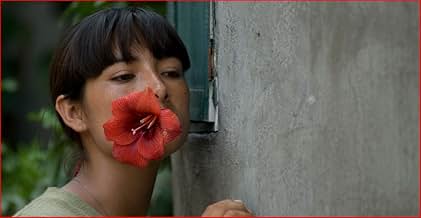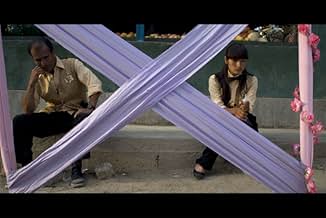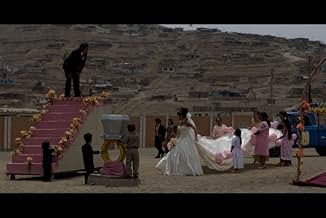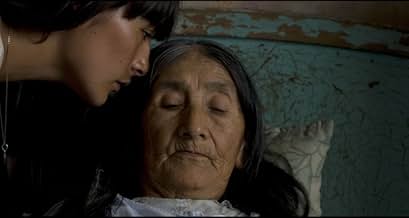VALUTAZIONE IMDb
6,7/10
7556
LA TUA VALUTAZIONE
Fausta soffre di una rara malattia chiamata "Milk of Sorrow", che viene trasmessa attraverso il latte materno delle donne che sono state maltrattate durante o subito dopo la gravidanza.Fausta soffre di una rara malattia chiamata "Milk of Sorrow", che viene trasmessa attraverso il latte materno delle donne che sono state maltrattate durante o subito dopo la gravidanza.Fausta soffre di una rara malattia chiamata "Milk of Sorrow", che viene trasmessa attraverso il latte materno delle donne che sono state maltrattate durante o subito dopo la gravidanza.
- Regia
- Sceneggiatura
- Star
- Candidato a 1 Oscar
- 16 vittorie e 6 candidature totali
Recensioni in evidenza
Writer/director Claudia Llosa loosely adapts the premise of old-time classics 'The Little Mermaid' and 'Faust' to contemporary Peru. Fausta, beautifully played by Magaly Solier, is a solitary, indigenous girl whose heart is gripped by fear. Her mother, who we see on her deathbed at the start of the film, was raped and scarred for life by The Shining Path (a radical Maoist organization that terrorized Peru during the 80s and early 90s). According to their indigenous culture, the terror felt by Fausta's mother was passed on to her through breastfeeding, a condition they call 'The Milk of Sorrow' (in Spanish, 'La Teta Asustada', which translates to 'The Frightened Tit'). Fausta is deeply suspicious of people around her, particularly men, and expresses her repressed emotions only through singing, as she performs her daily chores. Desperately in need for money to bury her dead mother, she begins to work as a housekeeper for Aida, a musician who is preparing for a concert and becomes interested in her songs of sorrow.
Llosa observes the social realities of Latin America (post-colonialism, class division, political violence), but avoids providing facile solutions. Instead, she focuses her attention on Fausta's more personal need for spiritual freedom. She does so with quiet, subtle humor and an eye for striking, poetic imagery.
I highly recommend watching this Academy Award nominee for Best Foreign Language Film and winner of the Berlin International Film Festival.
Llosa observes the social realities of Latin America (post-colonialism, class division, political violence), but avoids providing facile solutions. Instead, she focuses her attention on Fausta's more personal need for spiritual freedom. She does so with quiet, subtle humor and an eye for striking, poetic imagery.
I highly recommend watching this Academy Award nominee for Best Foreign Language Film and winner of the Berlin International Film Festival.
I can see that or why many people will like this movie. There is the very great portrayal of the main actress, there is running theme in here that speaks to many art-house fans (even those who may not know that they are).
The pacing might seem awkward, some twists in the story line and/or character arc, might not be accessible to some viewers, but all those things make the movie even better. At least that's how I see it. Still as this is a movie that provokes or encourages you to think a lot, there might come up a few questions, story-wise and or character-wise that might leave you with a slightly bad taste.
And although up until now the review the user GeneralGrievous gave hasn't received positive feedback, you have to cut the guy some slack. If you read his review, you can understand why he didn't like the movie quite as much. I thought his review was helpful, even though I don't agree on everything he writes, because he explains not only why he thinks that way, but he gives a few glimpses into his knowledge of Peruvian film-making.
The pacing might seem awkward, some twists in the story line and/or character arc, might not be accessible to some viewers, but all those things make the movie even better. At least that's how I see it. Still as this is a movie that provokes or encourages you to think a lot, there might come up a few questions, story-wise and or character-wise that might leave you with a slightly bad taste.
And although up until now the review the user GeneralGrievous gave hasn't received positive feedback, you have to cut the guy some slack. If you read his review, you can understand why he didn't like the movie quite as much. I thought his review was helpful, even though I don't agree on everything he writes, because he explains not only why he thinks that way, but he gives a few glimpses into his knowledge of Peruvian film-making.
Our heroine is called Fausta, a girl who is full of fear. "The Milk of Sorrow" or, more exactly "The Frightened Tit" is, in the Peruvian-indigenous tradition, an illness, is being condemned to be a coward. Peru's late History was influenced by guerrilla's warfare and state brutality. Women (like Fausta's mother) were raped, and raped women got sick... of fear. through her mother's milk Fausta is afraid of life, but she is by no mean a coward, because after her mother dies, her struggle is by herself. This movie is beautiful, it combines a very, very strong performance from Magaly Solier, and a universal human struggle in a very typical Latin American city.
La teta asustada is not, quite understandably, everyone's cup of tea. It is a slow, pensive, drawn-out film that almost feels like an ominous daydream. There is much that goes unsaid, and if you are not familiar with the Sendero Luminoso insurgency in Peru and the enormous amount of political violence perpetrated by both rebel and government forces, the underlying forces driving the film will not make that much sense. This is particularly the case with the rather disturbing opening scene and the graphic account of the rape of the protagonist's (Fausta) mother. There are also dynamics of class, gender, language, and race at work in this film, and the interplay between them is best understood with some prior knowledge of Peru, or Latin America more generally. The opening scene and the revelation that Fausta has placed a potato in her vagina to protect her from rape would be enough to turn many people off from the beginning of the film, and for good reason. Yet this film, to its credit, in my view, refuses to be anything other than what it is – an exploration of the legacy of trauma and fear of the Sendero Luminoso insurgency and the violence that came along with it. I enjoyed this film, but I appreciate films that are slow, melancholy, and leave plenty of time for pondering. It is not necessarily a feel-good movie, but felt more like a gloomy, ambiguous French film. It had more sad moments than happy ones, although that is only fitting of a film with such a dark topic at its heart. Yet there was something bizarrely hopeful about the film, and regardless of how bad Fausta's situation may have seemed, she showed admirable courage, and a faint light does appear at the end of the tunnel.
Fausta Isidora (Magaly Solier) is a weird young woman that lives permanently scared in a poor community in Lima. Her mother was raped by many men when she was pregnant of Fausta, and raised her daughter with a morbid fear of men. When her mother dies, Fausta has a bleeding and faints. Her uncle takes her to the doctor that finds that she keeps a potato inside her vagina to protect her against intercourse. Her uncle tells to the doctor that in accordance with the lore of the locals, she has a disease called "La Teta Assustada" (meaning "The Frightened Teat" in English) transmitted by the milk of an abused pregnant woman. Fausta decides to bury her mother in her home village, but neither she nor her uncle has the necessary amount for the coffin and the transportation. Fausta starts working as housemaid in the manor of a pianist to raise the necessary money; she befriends the gardener that helps her and Fausta finally resolves her issues.
"La Teta Assustada" is an exotic but boring and unpleasant low budget movie. The story is developed in slow-pace and probably will please viewers of the First World that maybe have never seen a slum and poor people like the dweller of Fausta's community. Magaly Solier has a great performance and her exotic beauty is impressive. The translation of the title of this film to English ("The Milk of Sorrow") is ridiculous since the correct translation would be "The Frightened Teat". The summary in IMDb from Pusan International Film Festival is ridiculous and the author has certainly not understood the story; or maybe the translation from Spanish was wrong. My vote is six.
Title (Brazil): "A Teta Assustada" ("The Frightened Teat")
"La Teta Assustada" is an exotic but boring and unpleasant low budget movie. The story is developed in slow-pace and probably will please viewers of the First World that maybe have never seen a slum and poor people like the dweller of Fausta's community. Magaly Solier has a great performance and her exotic beauty is impressive. The translation of the title of this film to English ("The Milk of Sorrow") is ridiculous since the correct translation would be "The Frightened Teat". The summary in IMDb from Pusan International Film Festival is ridiculous and the author has certainly not understood the story; or maybe the translation from Spanish was wrong. My vote is six.
Title (Brazil): "A Teta Assustada" ("The Frightened Teat")
Lo sapevi?
- QuizMagaly Solier used to sell Puca picante (Andean treat) in the street before she was discovered by Claudia Llosa in 2005 while looking for extras for Madeinusa (her first film). Now she's a recognized actress and talented singer.
- ConnessioniFeatured in Brief Film Reviews: The Milk of Sorrow (2010)
- Colonne sonoreQuizás algún día
Music by Magaly Solier
Lyrics by Claudia Llosa
Performed by Magaly Solier and Bárbara Lazón
I più visti
Accedi per valutare e creare un elenco di titoli salvati per ottenere consigli personalizzati
- How long is The Milk of Sorrow?Powered by Alexa
Dettagli
Botteghino
- Lordo Stati Uniti e Canada
- 10.462 USD
- Fine settimana di apertura Stati Uniti e Canada
- 1914 USD
- 29 ago 2010
- Lordo in tutto il mondo
- 1.557.750 USD
- Tempo di esecuzione
- 1h 35min(95 min)
- Colore
- Mix di suoni
- Proporzioni
- 1.85 : 1
Contribuisci a questa pagina
Suggerisci una modifica o aggiungi i contenuti mancanti






















